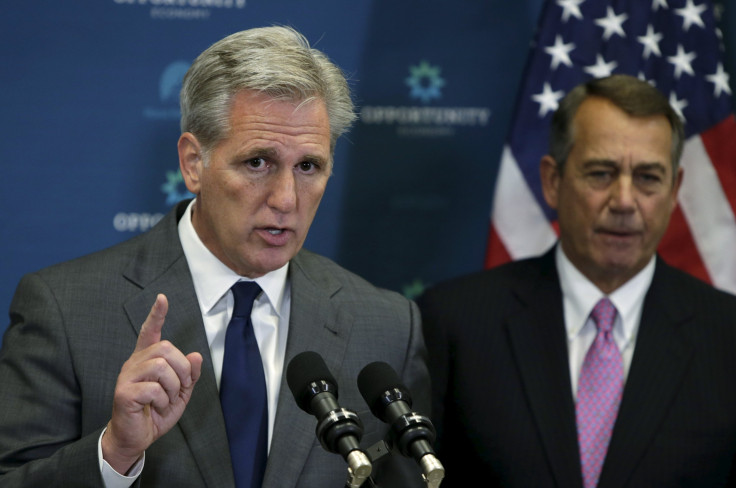House Speaker Kevin McCarthy? New Title Could Mean Big News For Tobacco, Banking Leaders That Give Him Money

Update: 12:35 p.m. EDT -- Rep. Kevin McCarthy, who was widely expected to become the next speaker of the House, reportedly dropped out of the running Thursday. The news broke after a scheduled closed-doors meeting among the Republican caucus at noon when the party was expected to vote internally for the new speaker.
McCarthy's once expected rise to the head of the House came after rellow Republicans entered the speaker race against him, including Rep. Jason Chaffetz, R-Utah.
Original story:
A little over a decade ago, Rep. Kevin McCarthy lived a life that exuded a sense of humility and understatement. He celebrated his election to Congress in 2006 at a California In-N-Out Burger with his family. He had run his race as the son of a firefighter and a small business owner, an image distinct from the extravagance and wealth of Washington, D.C. But as McCarthy has settled into his position as an American leader, he's now more likely to dine at high-end steak houses with lobbyists representing big money than at burger joints with plastic cups.
McCarthy is favored to win the most powerful office in the House of Representatives Thursday. Should he become the next speaker, the big money donors that have fueled his meteoric rise to the top will be looking for favorable treatment. Based on previous contributions to his campaign, McCarthy could be inclined to move in favor of nicotine companies on bills establishing e-cigarette protection for children, back a large telecom company on matters of internet taxation and protect Wall Street interests that want to keep Washington regulation away from their trade and loan practices.
The top industries that gave to McCarthy in the most recent election cycle are major sources of cash in D.C. politics in general. They have a lot to gain and lose from the legislation that makes its way through the halls of the Capitol and down Pennsylvania Avenue. They are, from biggest to smallest, the finance industry ($894,201), the real estate industry ($617,248), the insurance industry ($439,320), the oil and gas industry ($419,788) and the pharmaceuticals industry($372,800), according to data from the Center for Responsive Politics. That haul from the finance industry -- by far the largest donor industry in Washington -- makes him one of the top recipients from that group in Congress.
Those companies are giving money to his campaign because of his influence in Washington, not because he’s a local politician they support. Three of his top five industries – finance, insurance and pharmaceuticals— play big roles in his fundraising portfolio, but have a relatively small physical presence in his home district in California.
Several varied corporations populate the top tiers of McCarthy's donor base. The biggest donor was tobacco company Altria ($65,000), followed by Federated Investors Inc. ($55,400), Comcast ($49,600), Hewlett-Packard ($48,100) and Goldman Sachs ($46,550). Of the top 20 companies that gave to him in 2014, 11 of them employ lobbyists who also gave money to McCarthy.
Contributing money doesn’t, of course, guarantee that lawmakers will bend to an industry’s every will and whim. It does, however, mean that those companies will have at the very least quite a bit of access to the lawmaker.
"It's pretty clear it's not the case that you can just come in and say 'oh here's the $5,000' and suddenly you're on easy street," Michael Bailey, a professor of government at Georgetown University in Washington, said. "It's access for sure. You get to spend time with the speaker or the speaker's allies."
Meanwhile, there are four former staff members of McCarthy’s who are working on K Street, the colloqial name for the Washington lobbying industry. And, if their former boss wins his next election, their stock as lobbyists will have gone up that much more.
"It has always been the case that former staff of members who rise to the speakership tend to quickly develop a strong client base on K Street," Anthony Corrrado, a professor of government at Colby University in Maine, said. "Their knowledge of the speaker and his policy preferences is a valuable asset to have."
One of those lobbyists works full-time for ride share app Uber, and another works full-time for the American Insurance Association. A third works for lobby firm Nossaman LLP and represents a variety of clients including MasterCard, the American Association of Osteopathic Medicine and the Credit Union National Association. The fourth, who is not a registered lobbyist because of revolving door rules that bar recently-resigned Congressional staff from immediately registering to influence their former bosses, is the vice president of lobbying firm Franklin Square Partners.
But, no matter how much favor an industry may garner from the expected next speaker, McCarthy would still face a major challenge getting his fractured party organized enough to pass legislation at all. It was a load that pulled down the current speaker, and it's unclear whether or not the next speaker will be able to cut that weight.
"I don't think that the difference [for donors] will be all that great in terms of the public policy outcomes," Paul Herrnson, a professor of political science at the University of Connecticut, said. "The real issue is will he be able to hold his caucus together or will he fail. When a new speaker emerges it doesn't mean that his or her financial backers reap tremendous benefits. The story is more complicated."
© Copyright IBTimes 2024. All rights reserved.





















